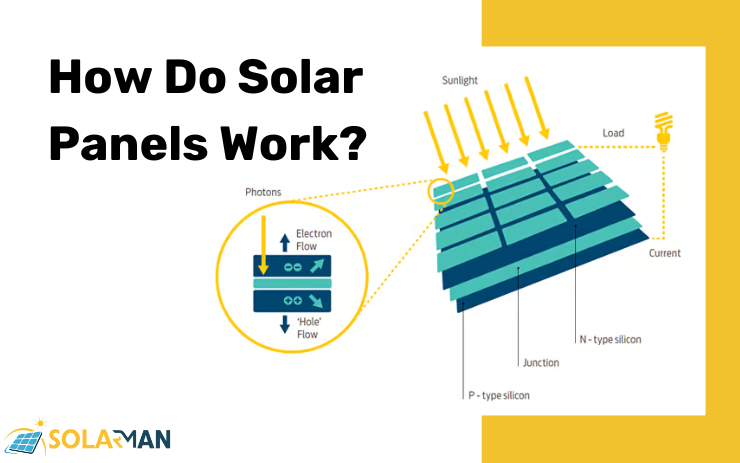Solar energy is becoming more and more popular as a clean, renewable source of energy.
One of the most important components of a solar energy system is the solar panel.
In this article, we’ll explore how solar panels work and how they can help you save money while reducing your carbon footprint.
Table of Contents
What are solar panels?
Solar panels are devices that convert sunlight into electrical energy.
They consist of photovoltaic cells, which are made of silicon and other materials.
When sunlight hits the photovoltaic cells, it knocks electrons loose from their atoms, producing a flow of electricity.
There are different types of solar panels, including monocrystalline, polycrystalline, and thin-film solar panels.
Monocrystalline solar panels are made from a single crystal of silicon, while polycrystalline solar panels are made from multiple crystals of silicon.
Thin-film solar panels are made from a thin layer of photovoltaic material deposited on a substrate.
How do solar panels work?
Solar panels work by converting the energy from the sun into electrical energy.
The process of converting solar energy into electrical energy is called the photovoltaic effect.
When sunlight hits the photovoltaic cells in a solar panel, it knocks electrons loose from their atoms.
These electrons flow through the solar panel and are collected by metal contacts, producing a flow of electricity.
The electricity produced by a solar panel is direct current (DC) electricity.
This is different from the alternating current (AC) electricity that is used in homes and businesses.
To use the electricity produced by a solar panel, it must be converted from DC to AC using an inverter.
Solar panels can work in different weather conditions, but they are most efficient when they are in direct sunlight.
In cloudy weather, the output of solar panels is reduced, but they still produce some electricity. In cold weather, solar panels can actually work more efficiently than in hot weather.
Types of solar panels
There are different types of solar panels, each with its own advantages and disadvantages.
Monocrystalline solar panels are the most efficient and the most expensive.
Polycrystalline solar panels are less efficient than monocrystalline solar panels but are also less expensive.
Thin-film solar panels are the least efficient but are the most flexible and can be used in a wider variety of applications.
Efficiency of solar panels
The efficiency of a solar panel is a measure of how much sunlight it can convert into electricity.
The efficiency of a solar panel depends on several factors, including the type of solar panel, the amount of sunlight it receives, and the temperature of the solar panel.
To increase the efficiency of solar panels, it is important to keep them clean and free of debris.
The angle and direction of the solar panels also play a role in their efficiency.
Installing solar panels at the correct angle and direction can increase their efficiency.
The efficiency of solar panels varies depending on the type of solar panel.
Monocrystalline solar panels are the most efficient, with an efficiency of around 20%.
Polycrystalline solar panels are slightly less efficient, with an efficiency of around 15%.
Thin-film solar panels are the least efficient, with an efficiency of around 10%.
Solar panel installation
Installing solar panels involves several steps, including designing the solar energy system, obtaining permits, installing the solar panels, and connecting the solar panels to the grid.
It is important to hire a professional solar panel installer to ensure that the solar energy system is installed correctly.
DIY solar panel installation is possible, but it is not recommended unless the installer has experience and knowledge of solar energy systems. Incorrectly installed solar panels can be dangerous and can cause damage to property.
Solar panel maintenance
Maintaining solar panels is important to ensure that they continue to produce electricity efficiently.
Cleaning the solar panels regularly can improve their efficiency by removing dirt and debris.
Troubleshooting common solar panel issues can also help to ensure that they continue to work properly.
Conclusion
In conclusion, solar panels are a crucial component of a solar energy system.
They work by converting sunlight into electrical energy through the photovoltaic effect.
There are different types of solar panels, each with its own advantages and disadvantages.
It is important to install solar panels correctly and maintain them regularly to ensure that they continue to produce electricity efficiently.
By switching to solar energy, you can save money on your electricity bills while reducing your carbon footprint.
If you are interested in installing a solar energy system, consider our products and services, including solar panels, solar charge controllers, solar inverters, solar accessories, and solar batteries.
We also offer professional solar panel installation services to ensure that your solar energy system is installed correctly.
FAQs
How much electricity can a solar panel produce? The amount of electricity a solar panel can produce depends on several factors, including the size of the solar panel, the amount of sunlight it receives, and the efficiency of the solar panel. A typical 250-watt solar panel can produce around 1,000 watt-hours of electricity per day.
How long do solar panels last? Solar panels can last for 25 to 30 years or more. The lifespan of a solar panel depends on several factors, including the quality of the materials used and the conditions in which the solar panel is installed.
What happens to solar panels at night? Solar panels do not produce electricity at night because there is no sunlight. During the day, excess electricity produced by solar panels can be stored in batteries for use at night.
Can solar panels work during a power outage? Solar panels can still produce electricity during a power outage as long as they are connected to a battery storage system. However, if the solar panels are connected to the grid, they will not work during a power outage.
- How much does it cost to install solar panels? The cost of installing solar panels varies depending on several factors, including the size of the solar energy system and the location of the installation.
- Solar lights
Solar Street Lights
KSh 9,600 – KSh 19,500Price range: KSh 9,600 through KSh 19,500 Select options This product has multiple variants. The options may be chosen on the product page




